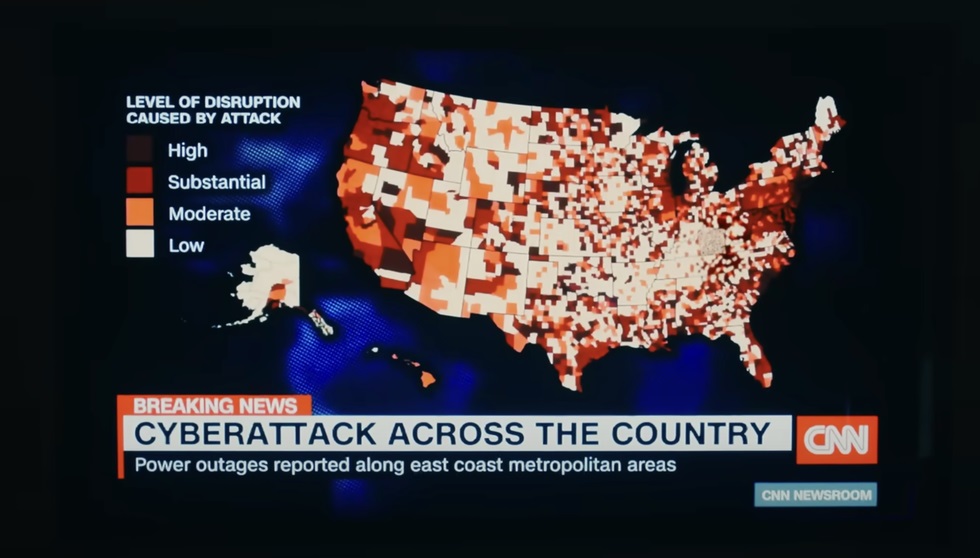by Brandon Smith, Alt Market:

There has been a lot of buzz lately about a recently released film by Netflix titled ‘Leave The World Behind’ based on a novel by the same name. The plot revolves around a catastrophic collapse in the US triggered by a cyber attack (and mass drone attack) that shuts down the internet and disrupts the global economy, leading to questions of who might have been behind the sabotage?
The most interesting aspect of the film is not so much the story (which is lackluster at best), but the fact that Barack Obama was so deeply involved in the making of the film as executive producer and as adviser on the script. This has led many people to suggest the movie is actually predictive programming – Propaganda designed to acclimate the masses to the idea of an event that is planned to happen in the near future.
TRUTH LIVES on at https://sgtreport.tv/
Similar concerns were raised back in 2021 when the World Economic Forum oversaw a “war game” called Cyberpolygon, an event meant to simulate a massive cyber attack on the vulnerable functions of the world-wide web. The reason Cyberpolygon raised so many eyebrows was perfectly understandable; the WEF had also hosted another simulation at the end of 2019 called Event 201. The game, which included the CEOs of some of the most powerful health and media corporations in the world along with numerous government officials, “coincidentally” focused on the outbreak of a global coronavirus pandemic, and it was held only a couple of months before the real thing happened.
In other words, it was as if the globalists at the WEF knew that covid was about to strike.
While Hollywood interpretations of cyber attacks are usually exaggerated in terms of the true effects, there is a very real and considerable threat associated with such a disaster. So-called “experts” in the tech field often dismiss the wider dangers to the internet itself because they have been indoctrinated into believing that the design of the web has too many redundancies. In other words, they act as if it is invincible.
This is not really the case. Though data loss can be prevented through cloud storage, the internet as a mechanism can still be shut down or taken down deliberately for long periods of time.
In the past I have written about a very interesting event that was barely covered by the corporate media called the “Fastly Outage.” In June of 2021 there was an internet outage that led to large swaths of the web going completely dark, including a number of mainstream news sites, Amazon, eBay, Twitch, Reddit. A host of government websites also went down. All this happened when content delivery network (CDN) company Fastly experienced a “bug.” Although Amazon had its website back online within 20 minutes, the brief outage cost the company over $5.5 million in sales.
A content delivery network is a geographically distributed network of proxy servers and their data centers. They make up the what is known as the “backbone” of the internet.
Fastly identified and fixed the problem within two hours and continues to claim the outage had nothing to do with a cyber attack. However, a huge vulnerability for the internet (a center of structural support Carl von Clausewitz would’ve called a “schwerpunkt”) was revealed to the public. A sizable portion of the web is dependent on only a handful of CDN companies, including Fastly.
It is also through collusion with these companies that governments are able to implement an “internet kill switch” in the face of possible civil unrest. A cyber attack would simply remove the government as the arbiter (or act as a false flag scapegoat so the government can avoid blame). But what would really happen if we lost the internet for a week, or a month or a year? In the US the result would be calamity because our economy has become far too dependent on digitization.
Around 10% of US GDP is directly tied to online commerce. This doesn’t seem like much, but a loss of that GDP would send the US into immediate and steep recession. Around 17 million jobs in the US are generated by commercial internet enterprises, and around 38% of these workers are employed by small businesses. According to surveys 70% of American workers say they cannot do their jobs effectively without internet access.
Keep in mind, if the trend of “work from home” during the covid lockdowns had stuck, an even bigger piece of the economy would be dependent on the health of the web.
The five industries considered most vulnerable to cyber attack are public administration, healthcare and pharmaceuticals, finance and insurance, education and retail. That is to say, these are the industries that are attacked most often. Attacks on vital utilities are usually the favorite set pieces for disasters portrayed in fiction and film, but these are actually far less worrisome. The real danger is the potential for an attack on the internet as a system. All it would take is for a couple CDNs or more to be hit simultaneously to cause vast online blackouts.
Most important of all are the ways in which international banking and finance utilize online networks to maintain the flow money. Without the web, trade velocity dies immediately and building it back from implosion could take years.
But who would benefit from such an attack? Certainly, foreign powers might see the crippling of America’s digital infrastructure as a way to severely damage the country without having to fight directly and militarily. However, there are also a number of benefits to the globalists.



